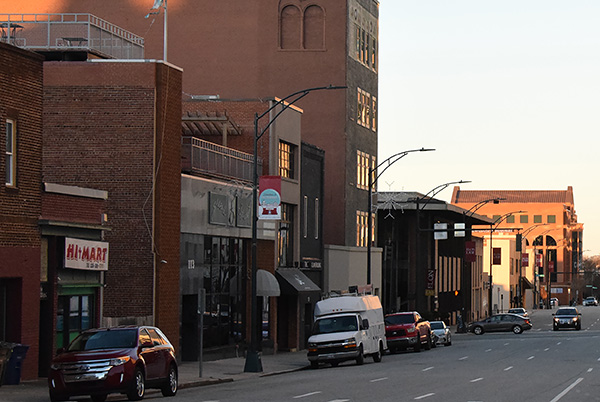On May 21 the Greensboro City Council plans to pass a “Good Repair Ordinance” that would set minimum standards for all nonresidential buildings in the city.
What are those standards?
Nobody knows and if you went to the City of Greensboro website to try and find out what those standards might be as of Wednesday April 17, there was no information available.
At the work session on April 16 in the Plaza Level Conference Room the City Council discussed in broad terms what might be included in such an ordinance. The Council discussed in general terms the ordinances that exist in Raleigh, Charlotte and Durham and the International Property Maintenance Code (IPMC).
But the City Council is short on specifics.
The direction given to staff by the City Council although not by a vote of the Council but more of a general, kind of, sort of consensus which means no councilmember objected loudly, is that the staff will base the good repair ordinance on the IPMC and at some point after staff has written this ordinance which may or may not include such “public safety” issues as peeling paint, a public meeting of some kind will be held for people to learn about the ordinance and offer support or voice concerns.
The only opportunity the public will have to bring concerns to the full City Council will be at the meeting on May 21, shortly before the City Council is scheduled to vote.
One part of what may or may not be part of the ordinance that did result in some questions by councilmembers was that the city could order a nonresidential building that had been vacant for over two years to be demolished.
A question was asked about what this would have meant for Revolution Mill which was vacant for decades and is now an increasingly vibrant and important part of the community, with residential, office and commercial uses.
The Council was told an exception would have been made for Revolution Mill and in at least one version of what may be in the ordinance there are exceptions for manufacturing and warehouse structures. Which raises the question of Center Pointe in downtown Greensboro which was built as the Wachovia Building and was vacant for decades. It was neither a manufacturing or a warehouse building, was vacant and was not in a great state of repair when Roy Carroll bought the building, renovated it and turned it into one of the premier residential addresses in Greensboro.
Would Greensboro be better off today if the owners had been forced to demolish the building?
The City Council discussed but reached no decision on what would provide grounds for a city inspection. What was considered was that five minor or one major violation would be required.
Although the discussion was about protecting the public from unsafe buildings the IPMC lists as a violations, “peeling, flaking and chipped paint” and cracked ceiling tiles. It also requires that all windows other than fixed windows, “shall be easily openable and capable of being held in place by window hardware.” In many buildings built before air-conditioning was popular, the windows are designed to be opened, but haven’t been opened in years. It would be a major cost to repair all of those windows that most likely wouldn’t be opened again, until the next inspection. It would mean a lot of work for the good folks at Double Hung window restoration company, but it’s hard to see much additional benefit.
The IPMC is an extremely comprehensive code covering every aspect of a building many of which don’t appear to have much if anything to do with public safety.
Councilmember Justin Outling is the driving force behind adopting a good repair ordinance and although the ordinance would add nonresidential structures to the residential structures already being inspected by the city, Outling said he did not see this ordinance as having a budgetary impact which means he doesn’t see any new inspectors being hired to enforce this code.
If no new inspectors are hired when thousands of new structures become subject to inspection then enforcement will have to be extremely selective and city staff not the City Council will have the sole authority to determine which nonresidential buildings will be inspected.
Councilmember Sharon Hightower suggested and had some support on Council for establishing a loan or grant program to assist property owners in bringing their properties in compliance with the new code, whatever it is.
If that is done even without new inspectors the program will have a impact on the budget.

